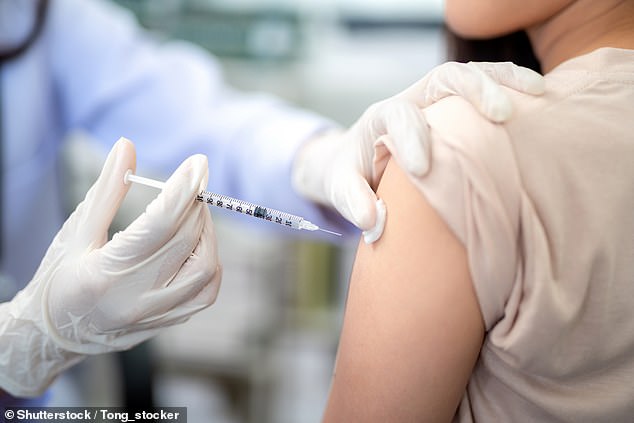By JOHN ELY DEPUTY HEALTH EDITOR FOR MAILONLINE
Published: | Updated:
Getting a flu jab could disrupt women’s menstrual cycles, scientists say.
Experts found the vaccine, administered to millions of women each year, made cycle length slightly longer than usual in a new study.
But the overall effect was minor, with the jab thought to make participants’ periods come a day late, on average.
The scientists said they suspected the change may be caused by the vaccine prompting the immune system to interact with a woman’s sex hormones.
The findings follow reports from countless women who have complained about late or unusually heavy periods after getting a vaccine.
Anti-vaxx campaigners have previously leapt on the reports, using them to peddle fears that jabs may affect fertility, though these have been dismissed by scientists.
Experts of the new study said it was critical to understand more about the interaction between menstrual cycles and jabs to help combat rising vaccine hesitancy.
In the latest research, scientists from Oregon Health & Science University in US analysed data from just over 1,500 women aged between 18 and 45.

Of these, 791 only had the flu vaccine, while 710 had flu and Covid jabs at the same time.
On average, women who had the flu jab saw their menstrual cycle length increase by half a day.
About one in 20 women in both groups experienced a change in cycle at least eight days after vaccination.
The alteration in menstrual cycle only occurred if women were vaccinated in the first half of their cycle.
Researchers found the increase only occurred if women were vaccinated during the follicular phase of their cycle – when an egg matures to be released during ovulation – which begins the day a woman gets her period and can last for 13 to 14 days.
Much like previous studies on the topic, these changes were found to be temporary.
What’s normal for a period?
A period is the part of the cycle when a woman bleeds from her vagina for a few days.
For most women this happens every 28 days or so but its not unusual for the cycle to be between 21 or 40 days for individual women.
Periods tend to last between three and to eight days, with the average being five.
Bleeding tends to be heaviest in the first two days.
Some women have irregular periods where the cycle is inconsistent.
For some this is natural and nothing to worry about, but the NHS advises women to contact their GP if:
- if their periods suddenly become irregular and they are under 45-years-of-age
- their periods come more often than every 21 days and less often than every 35 days
- their period lasts longer than seven days
- there is a difference of at least 20 days between the shortest and longest menstrual cycle
Writing in the journal JAMA Network Open, the US experts said their findings should help medics reassure patients worried about vaccine side effects.
They added the link between vaccines and menstrual cycle had been neglected in research, and must be addressed.
They said the exact mechanism of how vaccines caused changes in the cycle remained unclear.
However, they added the fact it only seemed to impact women in the first half of their cycle suggested the immune response generated by a jab was disrupting a woman’s production of hormones, affecting her cycle.
The authors said women wanting to avoid this disruption may wish to time their vaccinations accordingly.
They added that their study had some limitations, notably a small and not diverse sample size of women.
The length of the menstrual cycle varies between individual women, but the average is every 28 days.
However, cycles as short as 21 days or as long as 40 are not considered unusual.
The NHS advises women to contact their GP if their periods are irregular in certain situations.
These include: if their periods suddenly become irregular and they are under 45-years-of-age, their periods come more often than every 21 days and less often than every 35 days, their period lasts longer than seven days, and there is a difference of at least 20 days between the shortest and longest menstrual cycle.
Irregular periods can also lead to problems when women are trying to get pregnant as it becomes difficult to accurately track ovulation, the time when they are most likely to conceive.








